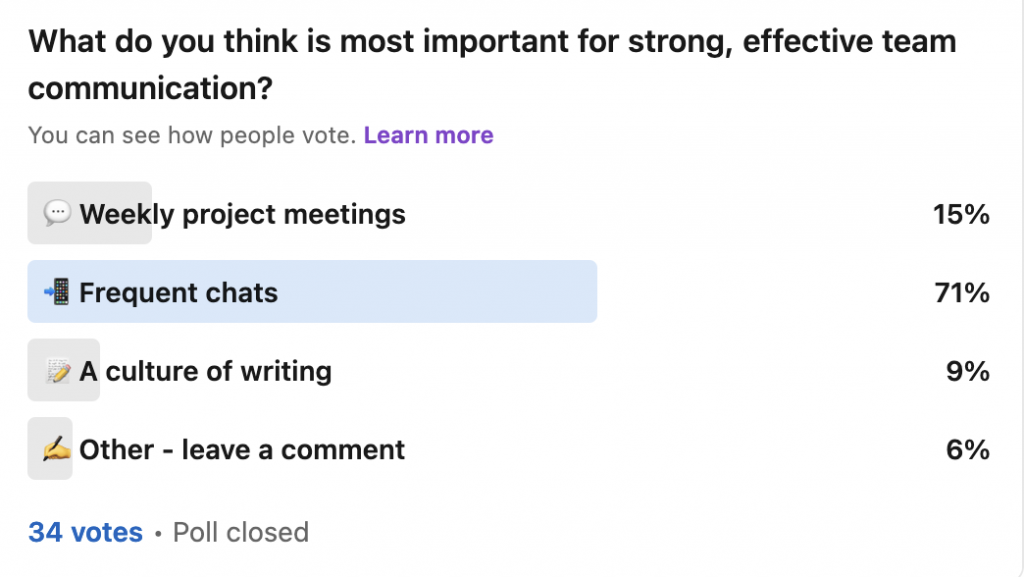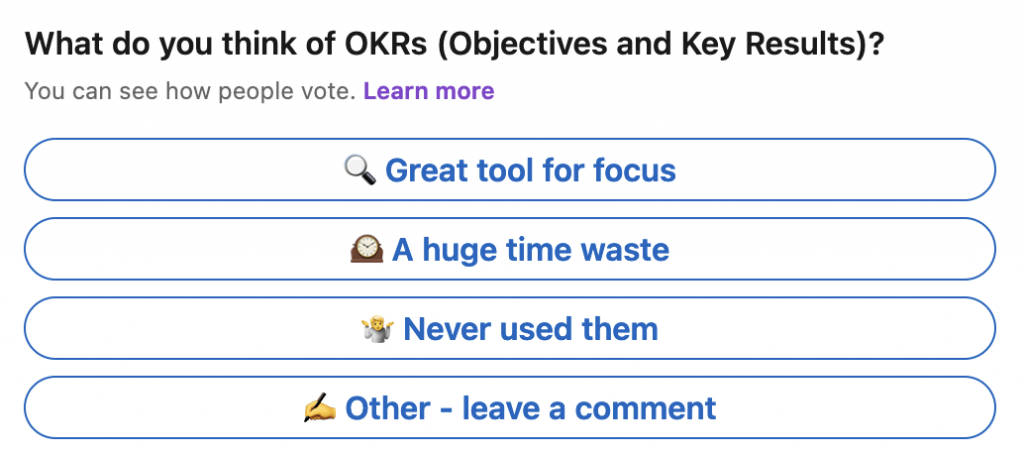“If you always do what you’ve always done, you’ll always get what you’ve always got.”
This phrase has been running through my mind a lot lately.
It’s a good reminder to mix things up, try new things, and avoid getting stuck in a rut.
As leaders, it’s easy to think that your “tried and true” is always the best approach, but then we can wake up and have a very outdated approach to things, or miss out on new approaches that could be better.
What are you holding onto? How can you mix things up?
Let’s take dive into this week’s lessons…
Table of contents
- 🥘 Food for Thought on Leading through Fires…
- 🥘 Food for Thought 2 on the Changing Rules of Learning
- 🗣️ Get Your Budgets Ready for Your Last Chance Ever.
- ❓ Poll of the Week on OKRs: Good idea or Bad idea?
➡️ Did a friend forward this to you? Get every issue straight to your inbox by signing up here.
Note: This is a preview of our weekly leadership newsletter, Lighthouse Leadership Weekly (LLW).
To get this sent to your inbox every week, along with our latest long form essays on this blog, you can sign up here.

🥘 Food for Thought on Leading through Fires
What a tragedy unfolding in Los Angeles right now. 🙏
It’s heartbreaking to see all the destruction and hear all the stories of people not just losing their homes, but also potentially being unable to rebuild due to the state of fire insurance in California.
As leaders, it’s important to remember just how important your home really is. If you don’t have stability in where you rest your head at night, nothing else really matters to you.
And that goes for A LOT more than wildfires. Divorce, home break ins, accidents, homelessness, moving, and struggling to find a new place to live, plus a variety of other factors can also cause similar uncertainty and concern.
As leaders, we should have empathy for those going through that as well as your teams’ loved ones that may be affected.
I was reminded of this catching up with a friend of Lighthouse, Mark C Crowley, who has had many in his family lose their homes to the fire.
Yet in the face of this, true leadership shows as Mark shared earlier this week:
A relative of mine lost his home in the LA fire last night.
— Mark C. Crowley (@MarkCCrowley) January 9, 2025
His children's school also burned down -- and it's the same school where he works.
Despite all his personal losses, he spent the night going home to home in his neighborhood looking for people and animals to save.
Some…
What you can learn from this:
No, this isn’t one of those cheesy LinkedIn kinds of posts. The REAL things we should learn from these sorts of incidents include:
- Face problems, don’t hide from them. The California government has not done a good job of maintaining their forests and they’re paying the price. And on an individual level, those who saw the fires coming were able to pack their bags and save priceless family heirlooms as they fled. They couldn’t stop their houses from burning down, but they could save what mattered most to them.
- The true test of leadership is what you do when things are hard. Like Mark’s son rushing to save neighbors and their pets, true bravery is doing the hard things, even when faced with difficult choices and circumstances.
- The impact is farther reaching than you may imagine. Mark lives in San Diego but so much of his family is in LA that it’s clear that’s where his heart and mind is right now. If he was on my team, I would 100% be making sure I checked in with him and lent an ear and any support he needed.
Your team remembers especially how you act in a crisis. If you don’t know who on your team has family in LA, now is the time to find out. Even the smallest bit of support and understanding can make all the difference.
It also builds the lasting loyalty that so many leaders hope to build with their teams.
🥘 Food for Thought 2 on the Changing Rules of Learning
Okay, yes, we’re going with double of the same kind of section, but there was more good stuff to talk about not much in the way of interesting data.
I don’t understand how people new to the workforce learn their trade in a remote environment.
— Jason Cohen (@asmartbear) December 5, 2024
Especially of software dev, design, sales, and marketing. You learn these by osmosis from peers and mentors.
You learn in the little things all day, not in classrooms. In the “drive…
This generated A LOT of good back and forth discussion, which I encourage you to click through and read, but one of the most interesting was where I and founder Arvid Kahl combined to weigh in:

It used to be “did you google it first?”
— Jason Evanish (@Evanish) December 5, 2024
Now it will be “did you ask ai first?”
I don’t think we know the delta yet on google vs ai to teach, but I think long term it may change your observation from a problem to not nearly as big of a deal.
I think Cohen makes a really good point. It’s much harder to build a good learning environment with a junior employee in a remote environment than when you can literally have them sit next to you in the office.
However, that notion is becoming less and less true right now.
AI is the great equalizer.
When we have technology shifts like we have right now with AI, the question you should ask is, “how does that change the way I work and lead?”
And Jason Cohen’s discussion he started is a prime example of where that applies. AI can solve a lot of the problems you may have bringing out the best in and leveling up your junior team members.
So how can AI help your junior employees thrive?
Don’t assume they can naturally figure it out. Instead, use your skills, ability, and internal network at your company to teach them to fish:
- Show them how you do certain tasks with AI
- Share tactics across the team as you learn what some people are doing
- Match people up for mentoring/teaching sessions based on shared skills and knowledge
- Try brown bag lunch and learn to share ideas and get ideas from those in different departments or companies
But it’s about more than that.
Be on the lookout for tech trends that change the rules.
Shifts like the one with AI is changing the rules of work. What we all do for work in a decade is likely to be quite different from what we’re used to today.
And it’s not the first time this has happened. We’ve seen a few shifts that made a big difference:
- Email replaced costly memos, meetings, and phone calls as the only options to communicate
- The first wave of VOIP made calls easier and more cost-effective, changing sales teams and inter-company collaboration
- Then once Zoom and other tech became good and error-free enough, remote work became possible and often even easy
- Now, AI is making it much easier to get help without bugging your coworkers
This is why as a leader you need to stay on top of technology, and always consider how this might change the rules of work.
How can you stay on top if you’re busy and have mastered the way things are?
- Use job interviews as an opportunity to get fresh ideas and see what others are doing and thinking about. (And why not then get value from every person that interviews, instead of the same old, same old questions and answers)
- Keep an eye on who is on your team that tries new things. Always be thinking about how others can use them
- Pay attention to larger trends, and remember that small ones often catch a wave and become big ones later (for example, think like how covid accelerated the remote work trend)
How do you embrace learning, both for your personal growth, and to recognize when it can apply to your team?
🗣️ Get Your Budgets Ready for the Last Chance Ever.
One of the nice things about the holidays this year was that it set up 2 very quiet weeks from an email and workload perspective.
This gave me a bunch of time to look at recent surveys, sales numbers, and general trends in the market.
And the signs I’m seeing are telling me that courses have run their course.
While we are 110% committed to delivering for all of our customers big and small due to take Lighthouse Lessons courses this year, we’re going to move in another direction going forward with future sales.
What that means for you: One Last Chance…
Before we retire all of our programs for good, we’re going to give you one last chance to take any of the courses we’ve developed over the years.
You’ll be able to take them any time in 2025.
But you’ll only be able to purchase them during the windows for each of them later this month.
So earmark your budgets, mark your calendar, and think about what course(s) you want to take before they’re gone.
Here’s the schedule for when you can reserve a spot for you and/or your team one last time:
- Week 1: January 20-24th, “The Classic Fundamentals”
Courses available:- The Mindsets of Great Managers
- The Coach’s Clinic
- The Secret Habits of Senior Leaders
- Sales Week 2: January 27-31st, “Mastering Management Skills”
Courses available:- The 1 on 1 Master Class
- Mastering Managing Up
- Mastering Motivation
We get emails all the time from people asking about courses that they just missed, or really wanted instead of what we made available, so this is your one, final chance to really act.
Take this opportunity to level up your leadership and master the most important skills you need to become a better leader in 2025.
Have questions? Reply and I’m happy to help you.
We’ll have more details for you as those weeks approach so you know everything you need to make the right choice for you and your fellow managers.
❓ Poll of the Week
Last week, we asked you about your favorite form of communication to keep your team performing at a high level. We had a very clear winner:

I’m not surprised by these results, because we’ve found that more, smaller check ins tend to be better than waiting for a big meeting. And while a culture of writing can help, that tends to be more important for remote teams than those primarily spending time in person.
Now, this week, our poll gets a little spicy 🌶️ , seeing what you really think about OKRs:

Thanks for reading this a day later than normal; it turns out that buying a car, moving, and doing Q1 kickoff work while running a business is a bit much to juggle at once.
We’ll be back to our regularly scheduled send time next Saturday.
Sign up to get this newsletter & our latest blog posts straight to your inbox:




